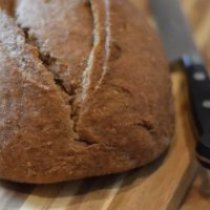Ingredients:
2 1 / 2 C warm water (100-110 degrees)
1 packet or 1 T yeast (regular or quick rise)
Option: 2 T oil or melted butter
1 T brown sugar, honey or other sweetener
6 C flour (A good combination is 2 1 / 2 whole wheat and 3 1 / 2 white. You may use a combination of whole wheat, white whole wheat, all-purpose white flour or bread flour. You may substitute I C wheat germ or flax seed meal for 1 C whole wheat flour. If adding wheat germ or flax meal, add it with the yeast so that these heavier flours can soften as yeast activates.)
1 T salt
Instructions:
- Sprinkle yeast onto water. Stir or whisk to wet yeast granules completely. Mix sweetener and oil, if using into the wet ingredients until dissolved. Let this stand about 10 minutes as yeast activates. Gather and/or measure other ingredients. Grease your pans by thoroughly brushing with olive or vegetable oil or spray with non-stick cooking spray.
- Stir the dry ingredients into the wet ingredients gradually to make a soft, sticky dough, adding the salt toward the end.
- Turn dough onto a lightly floured surface for kneading. Adjust amount of flour so that dough does not feel water – logged or runny. If it feels too stiff and you feel strain in your fingers as you knead, add a sprinkle of water. Knead about 10 – 20 minutes until dough loses its wet quality and you can see specks of bran against a lighter dough. It might still be a bit sticky.
- Clean the bowl and oil it lightly. Shape the dough into a smooth ball and put it in the bowl. Move it around in the bowl to collect some oil and then turn it over. Cover the bowl with plastic wrap or a dry towel. Be sure there is enough room for the dough to double. Keep bowl in a warm, draft-free place until doubled, about 30 – 45 minutes, up to an hour, as time allows. This develops flavor as well as lift.
- When dough is doubled, you may give it a 2nd rise, if time allows. This means deflate the dough, form it into a ball, return to bowl and cover for another 45 minutes. You can skip the 2nd rise and form the dough into loaves.
- Divide dough into 2 large or 3 small loaves. Squeeze out any air and shape or roll tightly into loaves, placing them each in a greased pan, seam side down. Cover and let rise again, until dough rises to just above the top of the pan, about 30 minutes. Slit the loaf in several places with a sharp knife or razor to let air escape in the over. This can be done once diagonally across the length of the loaf or several times diagonally across its width. Bake at 375 degrees about 25 – 35 minutes or until internal temperature of loaf is about 185-190 degrees. This is a time when a meat thermometer comes in handy! Insert it into the bottom of the loaf. OR, take the loaf out of the pan and tap it on the bottom. If it sounds hollow, it is probably done baking.
If you would like to be notified when we share new recipes, be sure to scroll to the bottom, provide your email address, check the box confirming you are not a robot, click on a few photos to prove it and click subscribe! You will then receive an email after each new post. Remember, we're always looking for new recipes, so keep sending them to ecopact@fspa.org!
Story:
This Easter Week or during the 50-day Easter season, let the Holy One feed your deepest hungers. Even make bread with this recipe for Basic Whole Wheat Bread. Consider how you give bread - material and spiritual - to the hungry. Live the Eucharist and pray "Holy God, give bread to the hungry and hunger for You to those who have bread."
As a follow up to last week's post on food pantries and food insecurity, consider how in the Easter season, you might develop a practice that feeds the hungry and your own hunger for God. After all, the 50 days of the season give us time to develop and maintain a new practice as much as Lent is meant to do! Let your inner voice tell you more about what is yours to do spiritually, materially for the good of the world.
This might mean adopting a food pantry and making a monthly donation of food. Or, if you save on groceries by foregoing a food indulgence, cooking from scratch or meatless more often, tally up the savings and add your local pantry to a monthly charitable giving practice. The season (which includes Earth Day on April 22) might inspire loving the earth through a practice that has been calling to you: gardening, recycling, reusing, reducing waste or writing to your elected official about your love of the earth and all her human and other-than-human creatures.





Post a Comment